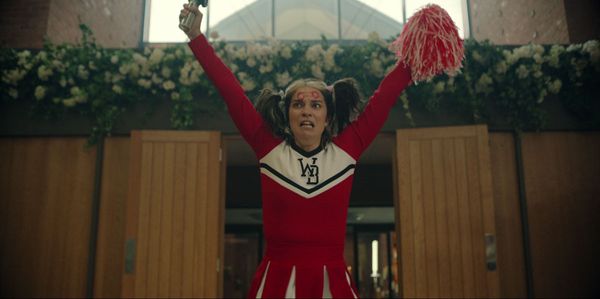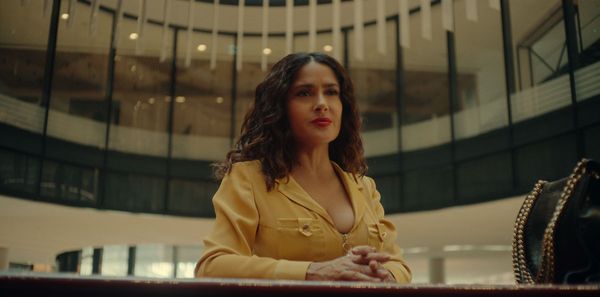
As the best fiction writer will tell you, stories with uncannily parallels in reality are products of happenstance and informed guesswork. The sci-fi genre is based on taking a known and spinning out possible ways man's hubris could make it go dark or terribly awry. That's why it's also referred to as speculative fiction.
Even if we know this to be true, "Joan Is Awful," the sixth season premiere of "Black Mirror," is an almost supernaturally precise parable that plays with the very real fears popping up in recent news chyrons.
"Black Mirror" creator Charlie Brooker wrote "Joan Is Awful" during the height of the pandemic and completed production on the episode shortly before ChatGPT launched in November 2022. He cannot have known that the trials of Annie Murphy's Joan would play the real-world anxiety gripping millions. Yet by tinkering with concerns about our mobile devices spying on us and folding those into our current paranoia concerning artificial intelligence running amok, he inadvertently realizes the trepidation workers and Netflix viewers around the world are grappling with.
"Joan Is Awful" is also absurd. What happens to the title character is absolutely ridiculous – or it would be, if deepfake Tom Cruise hadn't already conquered the Internet. Murphy's Joan is like most of us — an everyday woman with a middle management job who doesn't expect to be a victim of such technology and takes her relative invisibility for granted. When the story starts, she is assigned the unpleasant task of firing her friend (Ayo Edebiri) at the behest of an unseen board.
What happens to the title character is absolutely ridiculous – or it would be, if deepfake Tom Cruise hadn't already conquered the Internet.
Later on the same day, she admits to her therapist that she thinks her fiancé is boring, and yearns for the steamy sex she enjoyed with her toxic ex (played by Rob Delaney).
Joan has her former lover on the brain because he's in town unannounced and has been peppering her with texts to clandestinely meet. They do, and they kiss, but Joan breaks away to return home to her man and his bland cooking. They sit down to "Netflix and chill," although Brooker's fictional version of the service is called Streamberry.
Potay-to, Potah-to . . . however we see it, the home screen greets them with the streamer's latest hit: "Joan Is Awful," starring Salma Hayek – whose hair, clothes and job are nearly identical to those of Murphy's Joan.

Her only recourse, she decides, is to ruin Salma Hayek's life, since Hayek is famous and wealthy and has the resources to take on an international corporation. But there's an important catch: the actress isn't playing Joan. It's a digital version of Hayek licensed for Streamberry's use. The entire story is a work of CGI animated by a supercomputer. This explains why turnaround time between whatever actions Joan takes in the real world and the heightened, more attractive version served up to Streamberry voyeurs is so short.
So when a desperate Joan draws a phallus on her forehead, waltzes into a church wedding and empties her intestines in the middle of the aisle, Digital Hayek's Joan does the same, albeit with better hair and flawless makeup. The real (fictional) Hayek is not amused. But she's also as powerless as Joan.
Four years have passed between the critically panned fifth season and the latest one, and the average impression is that absence has not made the show uniformly better. Season 6 is inconsistent, but "Joan Is Awful" is an exception because it does what a "Black Mirror" episode is supposed to do. Which is to say, it's hilarious, horrifying and left off-center enough from 2023's actuality to be off-putting.
These episodes dropped a month and a half into the Writers' Guild of America's strike, where setting regulations surrounding AI is a core demand. WGA members are concerned that studios may use AI to replace human screenwriters, dwindling job opportunities and decreasing compensation as the demand for content escalates. Actors share that concern, as SAG-AFTRA's membership affirmed by authorizing its own strike if an agreement isn't be reached by June 30, when that guild's existing TV and theatrical contracts expire. (Salon's unionized employees are represented by the WGA East.)
Netflix is represented by the Alliance of Motion Picture and Television Producers in this strike, to which the average binge-watching consumer hasn't been paying much attention beyond worrying when new episodes of their shows will run out.

A similar thought applies to the second Season 6 episode, "Loch Henry," a slight and ghoulish commentary on the exploitative nature of true crime docuseries — Netflix's bread and butter.
"Joan Is Awful" is hilarious, horrifying, and left off-center enough from 2023's actuality to be off-putting.
The outrageous comedy of "Joan Is Awful" blunts whatever disquietude we may feel about the episode. When our accidental heroines make their way to the inner sanctum of Streamberry, they stumble upon a metaverse as infinite and varied as the individual observing them.
There are more Joans than Murphy's version or Hayek realizes, in the same way that the series within the series shows Hayek's Joan baffled to see her life story turning up in her Streamberry queue portrayed by Cate Blanchett. We can only surmise that Blanchett's Joan would be played by Meryl Streep, but that's irrelevant; the point is that there's always a better version of each of us out there willing to show the "real" us in our worst light.
Other meta impertinence plays directly to screen junkies. "They have taken 100 years of cinema and diminished it to an app!" the Oscar-nominated Hayek agonizes to her attorney, only to strut into Streamberry headquarters a few scenes later sporting a yellow jumpsuit reminiscent of Uma Thurman's signature look in "Kill Bill" — itself an homage to the tracksuit Bruce Lee wears in "Game of Death." Layers have layers, most of them provocative and ultimately meaningless distractions to the true concern.

Recently Brooker told Empire magazine that he tasked Chat GPT to write an episode of his signature show. The results were mixed at best.
"[It] comes up with something that, at first glance, reads plausibly, but on second glance, is s**t. Because all it's done is look up all the synopses of 'Black Mirror' episodes, and sort of mush them together," he told Empire. "Then if you dig a bit more deeply you go, 'Oh, there's not actually any real original thought here.'"
Less charitable evaluations of the sixth season have turned this around on Brooker, pointing out themes that have been recycled a few times too many or installments that ignore the operating directive of "Black Mirror." There is substance to that critique – most of the sixth season's episodes turn away from gazing at the sinister implications of our reliance on technology to explore the ways that humans are corruptible.
A couple are straightforward anthology-style horror stories having little to do with gadgets or circuitry, preferring to question the morals of the main character's choices.
These premises may not be original compared to where this series has traveled in past seasons, but they offer a throwback comfort that "Joan Is Awful" denies its protagonists and us. Joan and the celebrities who play her cannot escape the algorithmic menace, no matter how hard they struggle. They can only break the machine generating it, awakening a better future . . . in the present tense.
"Black Mirror" Season 6 is now streaming on Netflix.







